Uganda opens border to refugees fleeing DR Congo
Uganda closed its international borders in March 2020 due to the outbreak of the COVID-19 pandemic but on Wednesday it opened its borders for the first time to allow in the over 4,000 Congolese nationals who had been trapped in Zeu Forest at the border point of Gulajo in Zombo district.
REFUGEES RELIEF COVID-19
ZOMBO - Uganda has opened its borders with the Democratic Republic of Congo for three days to allow in fleeing nationals seeking asylum due to the intensified tribal clashes.
Uganda closed its international borders in March 2020 due to the outbreak of the COVID-19 pandemic but on Wednesday it opened its borders for the first time to allow in the over 4,000 Congolese nationals who had been trapped in Zeu Forest at the border point of Gulajo in Zombo district.
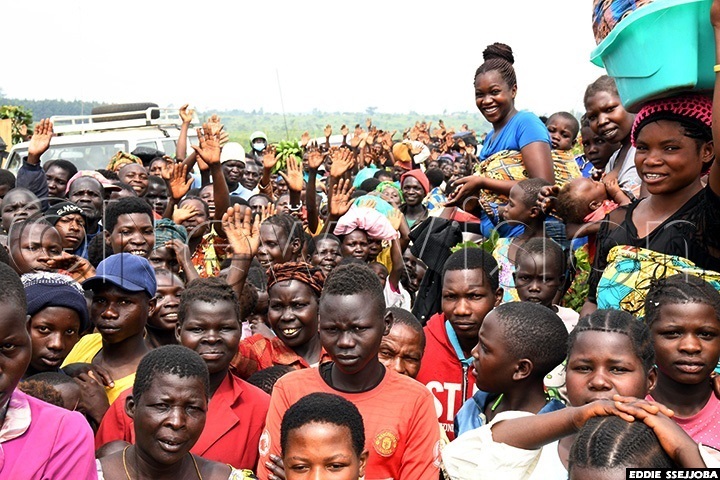
The nationals, including pregnant and breastfeeding mothers and children, were allowed into the country on humanitarian grounds after they stayed for months in the forest without access to relief food and other basic needs.
The groups, carrying small belongings and crying children, were Wednesday officially received by Hilary Onek, the minister for refugees and disaster preparedness at a place called Ayutepa, about 17kms from the Congo border.
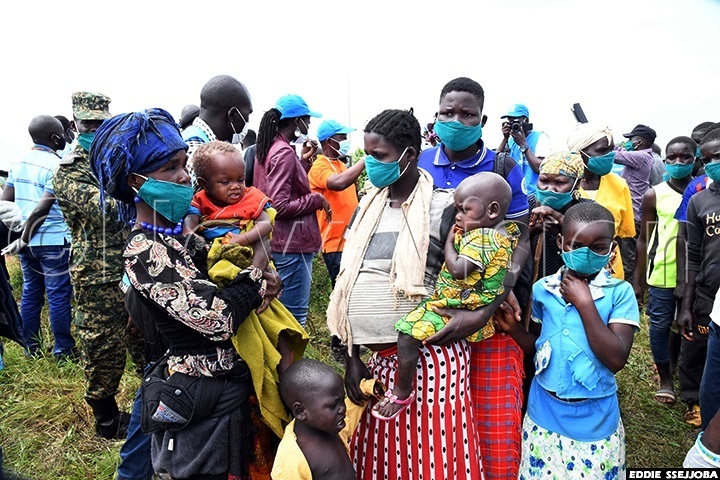
The minister was accompanied by Grace Freedom Kwiyucwiny, state minister for Northern Uganda Rehabilitation, the United Nations Humanitarian Commission for Refugees (UNHCR) country representative, Joel Boutroue, area MP Lawrence Songa, officials from the Office of the Prime Minister and district leaders.
They were all given face masks and sanitized before they were collected in one area from where they boarded UNHCR trucks and transported to Akaa Quarantine Centre located at the Zombo District Farm Institute. They will stay at the centre for 14 days, during which time they will be tested for coronavirus and the positive cases, according to officials from the OPM, will be isolated and treated and their contacts traced.
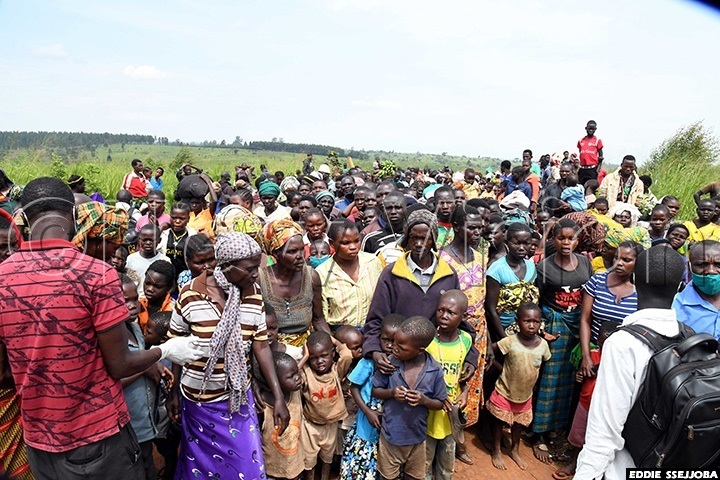
In the Quarantine Centre, the refugees were each given two blankets because the area is relatively cold, soap and other sanitary items, already made tents and other items.
The OPM area team leader, Jonathan Matata said the expectant mothers will undergo pregnancy tests and children immunized and receive all the necessary medical care including nutrition. They will also be registered and given tags, which he said will help the camp management to monitor them.
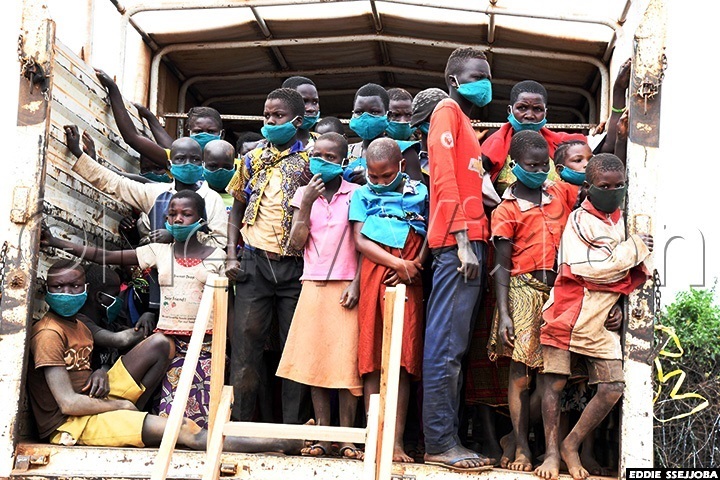
The Water Mission Uganda organization, which partnered with the UNHCR dag boreholes in the camp and was supplying at least 80,000 litres of clean and ready to drink water per day.
The mission country director, Tom Kisubi and Cissy Nawatene said each individual will be entitled to 15 litres of water per day but this would be adjusted to 20 litres once they settle. In addition, the organization had out in place temporally latrines, waste bins and put in place technicians to work on any breakdowns.
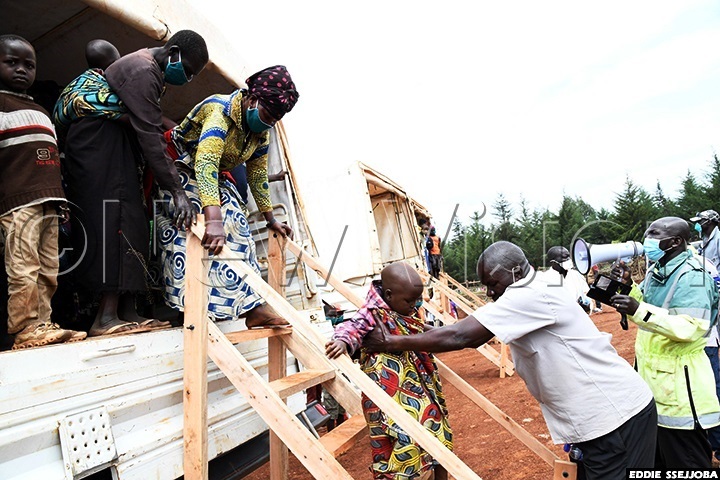
"WASH is core for refugees to avoid infections and due to the COVID-19 pandemic, we must ensure people have constant supply of water and clean water for drinking," he said, adding that they had put various water washing points in the centre.
Upon arrival at the centre, workers sprayed the trucks and luggage with disinfectants to ensure they minimized chances of coronavirus infections.
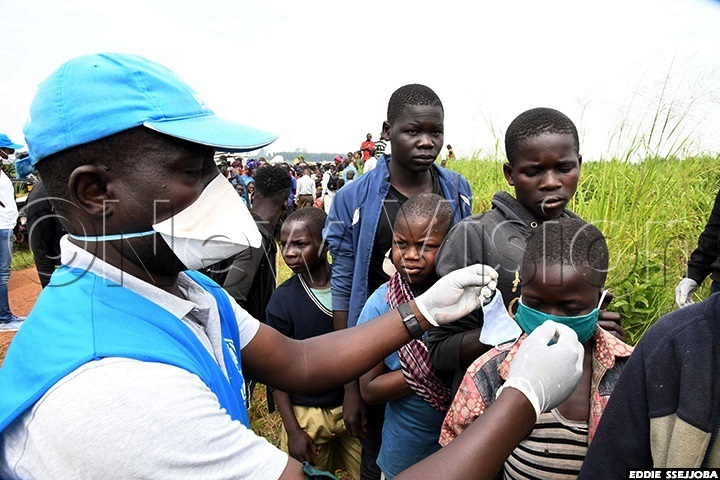
The OPM officials, working closely with local volunteers and UNHCR were using translators to communicate to the arriving groups, many of whom complained of hunger, saying they had not eaten since the previous day. Some women carried small bunches of bananas but the UNHCR reported that a team was in place to prepare food for them.
Minister Onek appealed to the international community to be sympathetic and increase funding to the UNHCR to cater for the needs of the increasing numbers of refugees in the country.
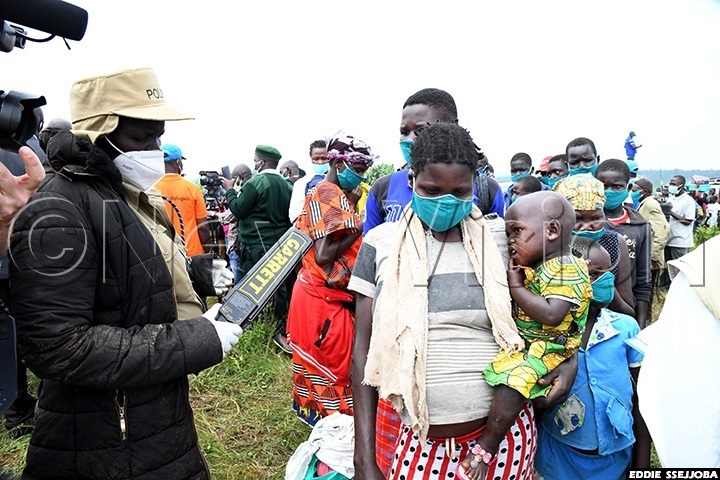
He said Uganda was concerned that the International community was getting fatigued with humanitarian needs but said the issue of refugees was not a Uganda government problem.
"This is an international problem that must be responded to by the United Nations and its sister agencies. I am therefore appealing to them to increase funding," he said, adding that reports that the UNHCR would discontinue some of its services in health and education by September if they don't get additional funding were worrying.
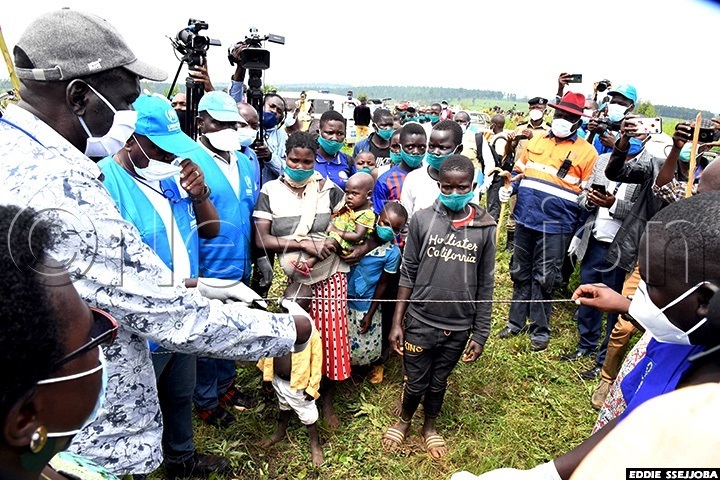
Onek however, warned the refugees to leave their misunderstandings at the border and ensure they remain peaceful once they are in Uganda.
He said that Uganda is a peaceful country and would therefore not entertain any continued conflicts among the tribes after learning that even among the fleeing groups, there were different tribes that have conflicts.
The groups that arrived included the Alur, Lendu, Hema and the Kebu who mainly speak French. "Our security will be monitoring you and if you are caught trying to engage in any fighting, all of you will be arrested and prosecuted," the minister warned.
The Alur kingdom in Uganda offered 2,000 acres of land to settle the refugees after the 14 days of quarantine. The Prime Minister, Vincent Ochaya Orach said among the refugees a big number belonged to the Alur tribe and remained brothers and sisters who needed to be helped during the crisis.
"On behalf of the Alur people, I pledge that we shall do our best to ensure there is a smooth transition of all the incoming refugees," he said.